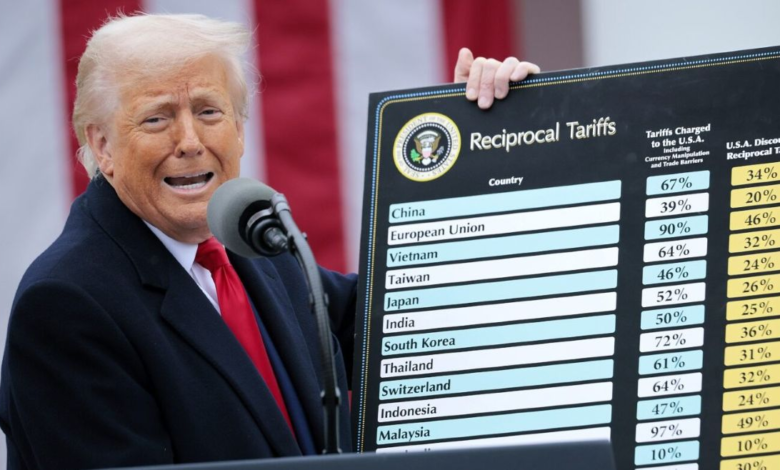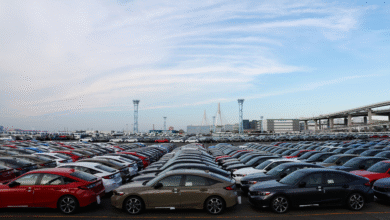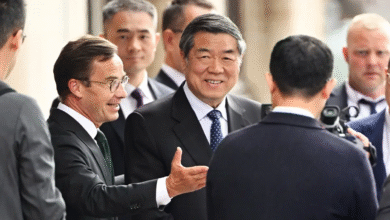Trump Tariffs: How Auto Giants Are Responding to Challenges

Trump tariffs have sparked significant upheaval in the auto industry, leading to price hikes, layoffs, and the introduction of hefty import fees. As the U.S. administration imposes a steep 25% tariff on foreign auto imports, major car manufacturers like Volkswagen are forced to rethink their pricing strategies and supply chain logistics. These tariffs aim to enhance U.S. auto production by encouraging manufacturers to shift their operations closer to domestic markets. However, the immediate fallout has seen companies announcing plans to raise vehicle prices to offset the increased costs. This situation not only highlights the tense dynamics of global trade relationships but also underscores how U.S. policy decisions can dramatically reshape the landscape of the automotive market.
The recent imposition of tariffs by the Trump administration has created ripples throughout the automotive sector, affecting both domestic and foreign carmakers. With the introduction of elevated import fees, American manufacturers face an increasingly competitive environment that challenges their operational strategies. Major automotive players, including brands like Volkswagen and Stellantis, are grappling with the consequences by adjusting pricing and halting production to navigate these new trade barriers. The escalation of tariffs has prompted these companies to rethink their manufacturing processes and supply chain dynamics to sustain profitability. As the U.S. auto industry braces for these changes, the implications for production, costs, and consumer prices are significant.
The Impact of Trump Tariffs on Car Manufacturers
The recent introduction of Trump tariffs, specifically a 25% levy on foreign auto imports, has sent shockwaves through the auto industry. Major car manufacturers are grappling with the implications of these increased import fees, prompting them to reassess pricing strategies and production logistics. Consequently, many companies are planning substantial price hikes to offset the added costs associated with complying with these tariffs. The auto industry, characterized by its global supply chains, now faces unprecedented challenges as it navigates the complexities of these tariffs.
In the wake of the tariffs, manufacturers such as Volkswagen and Stellantis have already set plans into motion to adjust their operations. Volkswagen, for instance, is adding import fees to the prices of vehicles shipped to the U.S. This decision likely reflects the broader trend of automakers needing to sustain profitability amidst rising costs. As manufacturing realigns towards domestic production, we are witnessing a pivotal moment in the auto industry, with potentially lasting effects on market dynamics.
Price Hikes: A Necessary Evil for Auto Giants
As car manufacturers respond to Trump’s tariffs, price hikes have become a common theme across the industry. Companies are feeling the pressure to increase sticker prices, which in some cases, can mean an increase of tens of thousands of dollars on certain models. Brands like Ferrari have explicitly stated their intention to elevate prices directly attributable to the tariffs, a strategy aimed at safeguarding their profit margins. This response highlights the stark economic realities faced by manufacturers, pointing toward a possible future where consumers bear the burden of these tariffs.
Moreover, price increases do not only affect high-end brands; they trickle down to more affordable vehicles as well. Amidst these shifts, other car manufacturers will need to decide whether to absorb some of the costs or pass them entirely onto consumers. The essence of the decision will largely depend on market competition and consumer behavior—if customers perceive that prices are inflated unjustly, they may shift their loyalty to competitors who can maintain more appealing price points.
Production Adjustments: Layoffs and Plant Closures
Production halts and layoffs have swiftly emerged as direct repercussions of the tariffs implemented by the Trump administration. Stellantis, for example, has decided to pause production at two facilities in North America, leading to temporary layoffs for nearly 900 U.S. workers. Such drastic measures are indicative of how manufacturers are adapting to heightened operational costs imposed by import tariffs. The decision to suspend work highlights the vulnerable position that many automakers find themselves in as they scramble to manage their workforce and financial commitments.
Furthermore, companies like Nissan have also halted production on specific models to navigate these tumultuous waters. The suspension of operations not only affects the immediate workforce but also has a ripple effect on suppliers and the broader economy. As these manufacturers reevaluate their production strategies, the impact of these tariffs is reshaping the landscape of U.S. auto production, potentially leading to a more localized manufacturing approach to mitigate future risks.
Volkswagen and the Strategy to Offset Tariffs
Volkswagen has taken a proactive stance in response to the tariffs by announcing plans to implement import fees on vehicles reaching the U.S. market. This strategic pricing adjustment illustrates the company’s attempt to manage the financial impact of the tariffs while remaining competitive. The decision to halt rail shipments of vehicles built in Mexico serves as another tactic to streamline operations and reduce exposure to additional tariffs on foreign-made products. This operational shift signifies a broader trend among auto manufacturers to mitigate expenses effectively.
The commitment to transparency is evident from Volkswagen, as they emphasize their dedication to both dealers and customers while formulating their response to tariff-related challenges. The ongoing adjustments highlight the company’s strategy to not only counterbalance the effects of Trump tariffs but also to foster a stronger domestic presence in the automotive market. As they navigate these changes, Volkswagen’s focus on U.S. production capabilities may pave the way for long-term growth prospects.
Regionalizing Supply Chains in Light of Tariffs
With the escalating trade tensions and the imposition of Trump tariffs, there’s an increasing urgency for auto manufacturers to regionalize their supply chains. Companies like Volvo Cars are already making strategic moves to boost their U.S. production to counterbalance the financial implications of the tariffs. By consolidating closer to their main markets, car manufacturers can mitigate shipping costs and avoid additional import fees that come with overseas production.
The overall trend in the automotive industry points towards a significant shift in how manufacturers view their operational footprints. As they adapt to these new tariffs, we are likely to see a push towards localized assembly within the U.S., thereby enhancing job creation while fostering a more resilient supply chain. This proactive regionalization not only aims at efficiency but also strategically positions manufacturers to leverage potential market shifts in the face of ongoing governmental policy changes.
Future of the U.S. Auto Industry Post-Tariffs
The future landscape of the U.S. auto industry looks markedly different following the introduction of Trump tariffs. With many companies facing increased costs, the long-term implications may reshape their business models significantly. As car manufacturers navigate the rough waters of price adjustments, layoffs, and shifts in production strategies, it’s crucial for them to remain agile and innovative in order to stay relevant.
As auto giants adapt to this new reality, we might witness a reinvention of their operational strategies which could lead to a more sustainable and competitive U.S. automotive market. The emphasis on bolstering domestic production, reducing reliance on foreign imports, and developing more resilient supply chains may ultimately transform how vehicles are produced and sold in America.
Consumer Reactions to Car Price Hikes
Consumer reaction is a significant factor that will determine the ultimate effectiveness of the price hikes initiated by auto manufacturers in response to Trump tariffs. As buyers face higher sticker prices, it’s essential for automakers to understand that customer loyalty is contingent upon perceived value. If consumers believe that the price increases are unjustified, they may seek alternatives, impacting sales and market share.
Additionally, socio-economic conditions play a vital role in shaping consumer behavior. As inflation continues to extend its reach into various sectors, consumers may prioritize essential purchases over luxury items or higher-priced vehicles. Given these considerations, automakers must strategically communicate their value propositions to maintain customer confidence while adapting to the evolving economic environment.
Navigating the Global Trade War
The ongoing global trade war is reshaping the auto industry’s landscape, challenging manufacturers worldwide to reassess their strategies and operations. With Trump tariffs marking a significant turning point, manufacturers are forced to adapt to an increasingly complex global trade environment. The imposing of tariffs on auto imports and parts creates a ripple effect that extends to international trade relationships, pricing structures, and competitive dynamics.
As countries engage in retaliatory measures, such as China’s announcement of a 34% tariff on U.S. goods, the implications for car manufacturers are profound. This shifting terrain demands vigilance and strategic planning from auto giants as they navigate through potential disruptions in their supply chains and market accessibility. The key for manufacturers will be to remain adaptable and responsive to these global shifts while developing strategies to mitigate risks associated with increased tariffs.
The Role of U.S. Production in Global Strategy
As automakers adapt to the challenges posed by Trump tariffs, the U.S. production landscape is poised to play a pivotal role in their global strategies. With the Trump administration intent on boosting domestic manufacturing, companies are re-evaluating their operational footprints within the U.S. market. This burgeoning focus on local production can lead to job creation and technological advancements as manufacturers invest in new facilities and modernized processes.
Manufacturers like Volvo Cars have already recognized the importance of enhancing U.S. operations to avoid the pitfalls of tariffs. The dedication to increased localized production reflects a strategic pivot that may result not only in compliance with tariffs but also a more robust American auto industry that can weather future disruptions. As the industry continues to evolve, the trends towards U.S. production could ultimately redefine competitive advantages in the global automotive market.
Frequently Asked Questions
How are Trump tariffs affecting the auto industry?
Trump’s tariffs are creating a ripple effect in the auto industry by imposing 25% import fees on foreign vehicle imports. This has led major car manufacturers to raise vehicle prices, pause production lines, and implement layoffs across the sector, significantly impacting the overall market.
What are the reactions of car manufacturers to Trump’s tariffs?
Car manufacturers are reacting strongly to Trump’s tariffs by raising sticker prices, imposing import fees, and pausing production at facilities. For example, Volkswagen is adding import fees to vehicles shipped to the U.S., while Stellantis and Nissan have halted production on certain models, resulting in temporary layoffs at supporting plants.
Will Trump tariffs lead to price hikes for consumers?
Yes, Trump’s tariffs are expected to lead to substantial price hikes for consumers. Automakers like Ferrari and Volkswagen have already indicated intentions to raise prices on various models to offset the additional costs imposed by the tariffs.
How do Trump’s tariffs impact U.S. auto production?
Trump’s tariffs are designed to boost U.S. auto production by encouraging manufacturers to shift operations back to the U.S. However, the immediate impact has been mixed, with some manufacturers pausing production and laying off workers as they navigate increased costs and new import fees.
What is the effect of Trump’s tariffs on Volkswagen’s pricing strategy?
In response to Trump’s tariffs, Volkswagen has announced it will increase the import fees added to the sticker prices of its vehicles sold in the U.S. This adjustment reflects the company’s efforts to mitigate financial losses due to the tariffs.
Are Trump tariffs causing layoffs in the auto sector?
Yes, Trump tariffs have prompted several car manufacturers to announce layoffs. Stellantis, for example, has laid off approximately 900 workers at supporting plants following production pauses initiated in response to the tariffs.
How are global trade tensions linked to Trump’s tariffs on cars?
Trump’s tariffs on cars are closely linked to escalating global trade tensions, which have led to retaliatory measures, like China’s announced tariff on U.S. goods. This interconnected trade landscape is causing volatility in automotive production and pricing globally.
What steps are car manufacturers taking to adjust to Trump’s tariffs?
Car manufacturers are adjusting by increasing production in the U.S., raising vehicle prices, scaling back on imports, and redefining supply chains. For instance, Volvo Cars is planning to enhance its U.S. production capabilities to better navigate the financial challenges posed by the tariffs.
| Key Points | Details |
|---|---|
| Trump Tariffs | 25% tariffs on foreign auto imports and additional parts tariffs coming by May 3. |
| Impact on Stock Market | Shares of major car brands fell sharply due to uncertainty regarding tariffs. |
| Volkswagen’s Response | Adding import fees and suspending rail shipments of vehicles built in Mexico. |
| Stellantis Actions | Paused production at Canadian and Mexican plants leading to temporary layoffs of about 900 U.S. workers. |
| Nissan’s Production Halt | Infiniti brand halting production of certain Mexico-built vehicles. |
| Volvo’s U.S. Production Increase | Plans to boost production in the U.S. amid global supply chain adjustments. |
| Ferrari’s Price Hike | Announced up to $50,000 price increases on certain models post-April 1. |
Summary
Trump tariffs have led to significant changes in the automotive industry, forcing major manufacturers like Volkswagen, Stellantis, Nissan, Volvo, and Ferrari to adjust their strategies. The implementation of these tariffs has resulted in price hikes, production pauses, and layoffs among U.S. workers, illustrating the financial strain on car giants as they navigate the complexities of a trade war. Overall, the tariffs are reshaping the landscape of auto manufacturing and commerce in the United States.




